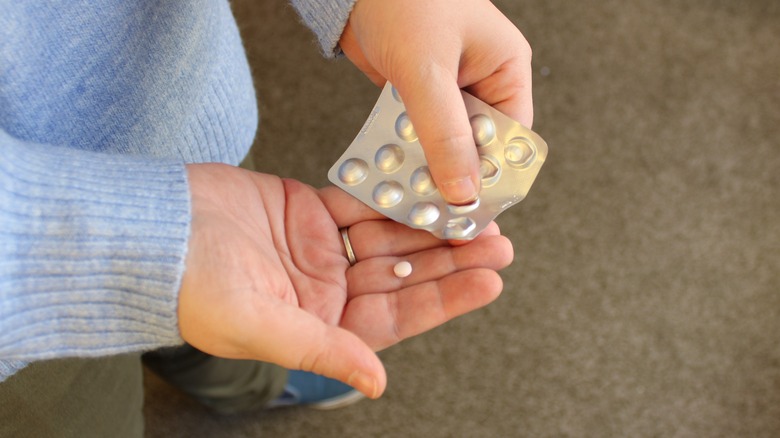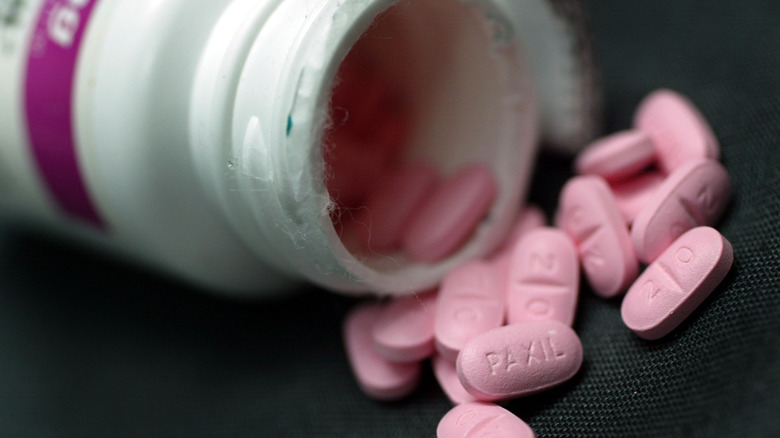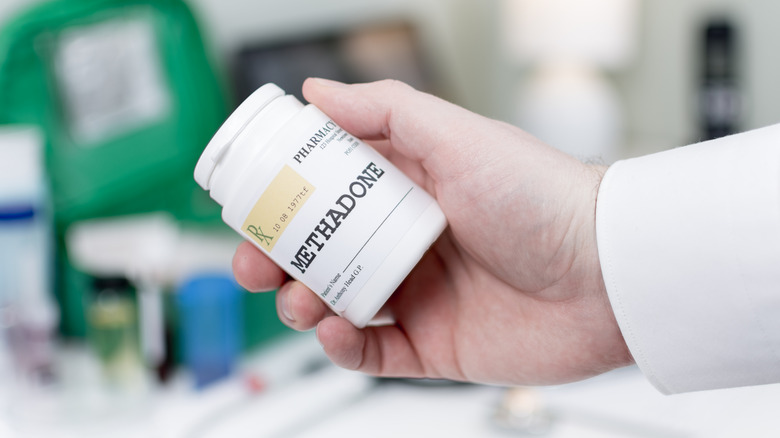Medications That Can Cause Nipple Discharge
You look down at your shirt and notice a wet spot right around your breast. Assuming you dropped something, you don't think much about it until a few days later when discharge comes from your nipple. You've combed the internet for every possible cause since you aren't pregnant. The galactorrhea (nipple discharge) you're experiencing may potentially come from a few different causes, including breast cancer or an endocrine disorder. It may also come from a medication you're taking.
Many different medications can cause you to have nipple discharge as a side effect. Using different mechanisms, these drugs react with your brain in such a way as to increase the level of prolactin, the hormone that causes milk to release in the breasts. So, when the prolactin is too high, you can experience a milky discharge.
While this side effect can be irritating and embarrassing, it won't cause you any harm. However, it can interfere with everyday life, so it's always best to know the specific medications that can lead to issues. That way, you can determine if you want to avoid them or work on a treatment plan with your healthcare professional.
Antipsychotic medications lead to galactorrhea
Antipsychotics are a class of medications that help to relieve psychosis symptoms such as delusions and hallucinations, according to the Centre for Addiction and Mental Health (CAMH). Common drugs include risperidone, aripiprazole, fluphenazine, loxapine, and pimozide, to name a few. While every pill has side effects, you might wonder why the pill you're taking for your schizophrenia leads to nipple discharge. It comes down to the dopamine.
Psychosis is typically caused by the part of your brain that releases dopamine. It gets a bit too overzealous and releases too much to handle, leading to voices and delusions. The medication blocks dopamine so that you don't get too much of a good thing and can focus more on life. While antipsychotics are good for helping on the dopamine front, blocking that dopamine can lead to prolactin secretion since dopamine works to inhibit it.
Dr. Deanna Kelly, director of the Treatment Research Program at Maryland Psychiatric Research Center, told Psychiatry Online that "Prolactin elevation has been widely published, though when the results from men and women are pooled, it doesn't seem so profound. Yet when you separate the effects by sex, mean elevations are two to three times higher in women compared with men." So, it's important to discuss this side effect with your healthcare provider.
Selective serotonin reuptake inhibitors might elevate prolactin
Not having enough serotonin is theorized to lead to depression. This is known as the serotonin hypothesis, and it's why selective serotonin reuptake inhibitors (SSRIs) are known to work in treating depression and anxiety (per World Psychiatry). It's hard to break down everything you need to know about serotonin; but, at its core, it's a messenger that relays signals in your brain. However, why SSRIs can lead to nipple discharge isn't as well understood.
A small 2017 study in Psychiatry Investigation showed that people taking SSRIs had higher than normal prolactin levels, but the reasoning wasn't clear. It's hypothesized that allowing the body to have more serotonin affects how dopamine and serotonin react with one another. In theory, this could inhibit dopamine's reaction to regulate prolactin. Additionally, different SSRI medications can have higher instances of side effects than others. Common SSRIs that have an impact include citalopram, fluvoxamine, escitalopram, paroxetine, and sertraline.
SSRIs can also have other side effects like headache, drowsiness, insomnia, and sexual problems, states the Mayo Clinic. Switching your medication or treatment might be an option when the side effects hinder your everyday life.
Antihypertensives might cause nipple discharge
Medications are a necessity for most Americans, not just for your mental health. Many people take medication to help regulate their cardiovascular systems to ensure everything stays within normal levels. Antihypertensive medications keep the cardiovascular system running at its best by controlling blood pressure, especially in those with hypertension. But a type of blood pressure medication called calcium channel blockers — especially the drug verapamil — can increase prolactin, causing nipple discharge (per Pathology First).
According to the Mayo Clinic, calcium channel blockers are used to lower blood pressure by limiting the amount of calcium in the cells since calcium causes cause the heart and arteries to contract. Limiting the contraction causes blood vessels to open and your blood pressure to go down. Lower blood pressure lowers your risk for cardiovascular diseases like heart attack and stroke. In addition to having nipple discharge, individuals taking the drug can also experience constipation, dizziness, and fatigue.
Verapamil isn't the only calcium channel blocker that can increase prolactin within your system, but it is the most significant (per American Journal of Physiology). So, you might want to research other medications available for your high blood pressure treatment if you're experiencing this and other symptoms.
Hormone medications can lead to galactorrhea
Breast discharge might be scary if you aren't pregnant. But before you start to worry, take a look at your birth control. Women taking estrogen or those using hormonal contraceptives can see milky discharge from their nipples as a side effect. The reasoning behind this is simple: Birth control pills and hormone-replacement therapy (HRT) are changing estrogen levels within the body.
Birth control pills are offered throughout the United States to females choosing not to get pregnant (per Mayo Clinic). These pills often use estrogen and progesterone to control the levels of hormones in your body to shut down ovulation and your fertility window. They can also thicken the cervical mucus to make it harder for sperm to get into the uterus. Other side effects of birth control pills include bloating, headaches, and breast tenderness.
While younger women use birth control pills to avoid pregnancy, women going through menopause use HRT to help relieve some of the symptoms of the falling levels of female hormones, says NHS Inform. There are several different HRT medications to choose from, and the side effects are very similar to birth control pills. Those looking to get away from galactorrhea symptoms might consider changing their medication to one with a lower level of estrogen after discussing it with their OB-GYN.
Long-term opioid treatment can cause nipple discharge
An opioid is also known as a narcotic and is commonly given out for either acute or chronic pain, according to the American Society of Anesthesiologists. You won't typically experience nipple discharge due to getting a prescription of opioids for your wisdom teeth extraction. However, long-term use of opioids — whether due to either chronic pain or addiction — can lead to additional side effects, like nipple discharge.
Opioids can affect the release of prolactin, leading to nipple discharge in some patients that take the drug long-term. However, nipple discharge can also happen in long-term opioid users without an elevation in prolactin, according to a study in the Irish Journal of Psychological Medicine. This side effect might have more to do with the opioid's impact on the endocrine system rather than prolactin. Long-term use of opioids can also lead to dependence and tolerance to the drug, meaning you need more to get the desired pain-relieving effect, states Cleveland Clinic. Individuals might also experience sleep disorders and chronic constipation.
Dealing with nipple discharge from medications can be a scary and embarrassing experience. Thankfully, you have options, like wearing pads or changing your medications if the side effects become a nuisance. Your healthcare provider will be able to work with you on ways to limit the impact galactorrhea has on your life.






